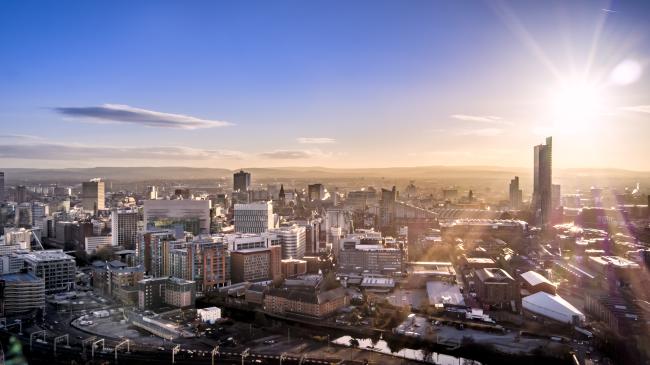A building boom is happening in the UK’s second city as young workers flee soaring living costs in the capital and others in the region are drawn to its energy and quality of life.
Manchester is having a moment.

Ten years after gaining powers from the central government in London over areas ranging from urban transport to local planning, the world’s first industrial city in the north of England is at the center of a political, cultural and commercial growth spurt.
At the heart of the city’s current renaissance is a pitch to knowledge workers who want the best of big city life combined with a gentler pace that’s closer to nature, all while enjoying a shift to flexible working in modern, sustainable buildings.
Hailed as the fastest-growing tech city in Europe by Tech Nation in 2020 and home to regional headquarters for Amazon.com and Klarna, the city is the largest in the group of 10 councils in the metropolitan county known as Greater Manchester. Its economic output, based on gross value added, is forecast to grow 2.2% by 2027, faster than that of London, according to consultancy EY’s Economic Growth Report. Employment among those aged 16 to 64 rose to 71.4% in 2023 from 67.8% the previous year, data from the Office for National Statistics show.
“Manchester has momentum,” says Joshi Herrmann, who runs the hyper-local media startup Manchester Mill out of a suite of plant-filled offices in the old Royal Exchange building where Nathan Rothschild built his fortune before moving to London. Also made in Manchester: the first-ever railway line and first-ever working canal.
While Manchester jostles with Edinburgh and Birmingham for the title of Britain’s “second city,” it has the largest student population in Europe, and according to the Centre for Cities more than half of those at Manchester University choose to remain after graduation.
The city’s self-confidence is legendary. It boasts cultural capital not only from the world’s most famous football team in Manchester United but also from a “Madchester” music heritage, and in Andy Burnham it has a thrice-elected Labour mayor who carried almost two-thirds of the electorate’s vote.
Burnham wastes no opportunity to argue that localism beats centrism when it comes to governing, taking powers away from London’s Westminster.
“For all our lives, people in the North had been treated by Westminster as second-class citizens,” he writes in Head North: A Rallying Cry for a More Equal Britain, co-written and published in February with another Labour metropolitan mayor, Liverpool’s Steve Rotheram. After his recent reelection he emphasized “place first rather than party first” in his acceptance speech.
The city’s clout is likely to grow after voters nationwide returned a Labour government to power for the first time since 2010. The greater region has 27 Westminster representatives — a good chunk of whom are Labour. The group includes Angela Rayner, now deputy leader, from Ashton-Under-Lyne.
Politics aside, the city is changing quickly.
As Burnham writes in Head North,
“One look at the modern Manchester skyline tells you that something is happening in our city.”
More than two dozen towers have gone up in central Manchester in the past five years, with another 20 under construction and 51 more approved or under consideration, a September survey found. While not everyone welcomes that development and the displacement from its associated gentrification, the reality is undeniable.
Consulting firm Deloitte’s recent regional building “Crane” report on Manchester notes just under 20,000 new homes built since powers were devolved in 2014, and 2,000 new hotel bedrooms built or under construction since 2022. This reflects the continuous growth of the city around where to live as well as were to work. Although Manchester is overall by no means a rich city — according to the City Council it ranks sixth out of more than 300 local councils for deprivation — it is rich in property development, which in turn fuels the engine of growth.
Unsurprisingly, Manchester features in another global real estate indexes of cities on the up. In the first, it’s the only English city outside London to be named in a new “Innovation Geographies,” a 108-strong list produced by global property firm JLL ranking those places benefitting most from the knowledge economy. It puts Manchester alongside Taipei and Milan among innovation-rich cities that are “lifestyle-centric locations.”
Ed Caesar, an award-winning author and New Yorker writer, would agree. He and his wife, Chloe Fordham, a criminal barrister with Exchange Chambers who has family in the area, moved here 10 years ago. “London is too tight and small for how we want to live with space and good schools,” he says. Manchester “was really the only city that made sense” due to its international airport and two-hour train journey to London. “Plus, it felt like a city that exciting things were happening in.”
Manchester thrives by kicking against London, but its rivalry with the capital is nothing new. In a new book, Made in Manchester: A People’s History of the City That Shaped the Modern World, author Brian Groom quotes one of many “Manc” stars, writer Anthony Burgess, commenting that 100 years ago “for a Mancunian to visit the capital was an exercise in condescension.”
Alexandra Livesey, the German-born chief operating officer of flexible workspace provider Clockwise, moved from London to Manchester during the pandemic because “my husband is a Mancunian and we always wanted to come back home.”
I met her at a conference organized by the Manchester chapter of the Forum for the Built Environment which happened in one of the city’s shining new business developments: The Eden building. Here, two of the biggest trends in office redevelopment are happening, and both contribute to Manchester’s success: sustainable credentials and flexibility. The Eden building is carpeted on the outside by Europe’s largest living wall of greenery growing up its exterior surfaces. Its 12-story, 115,000 square feet are being marketed “for businesses who are serious about protecting the planet.”
The issue of sustainability chimes with the political objectives of decarbonising existing buildings and of being a “zero carbon, climate resilient city” as part of its Manchester Climate Change Framework to become net zero by 2038.
Young workers increasingly expect employers’ values to align with theirs. According to LinkedIn, 73% of Gen Z are more worried about climate change than they were a year ago, and 60% would consider declining a job offer if their potential employers didn’t have appropriate green credentials.
Then there’s flexibility, which the UK is actually embracing. Three-quarters of UK employees offer some “location flexibility,” with 44% offering a form of “structured hybrid” work and 38% requiring two to three days in the office, according to the Flex Index, which tracked 5,000 UK companies and 3 million employees for their study.
This explains why one of the first tenants at 100 Barbirolli Square is flexible workspace company Koba and why Clockwise chose Manchester as one of its 17 UK locations. Livesey says Manchester’s size and scale, small enough to be compact and large enough to have energy, epitomizes what she called “a 10-year development of behaviors and patterns” around local and flexible living and working.
Perhaps the final piece in this picture is localism and what Manchester City Council has called “Our Manchester Strategy.” This places considerable emphasis on ease of movement around the city. Although there are legendary unresolved and expensive problems of crossing the region, Manchester’s city transport system of trams and buses does work. Mayor Burnham secured £1 billion in Treasury funding in 2021 for his much-loved Bee Network of integrated public transit, a plan that has paid off, and won another £20 million from Westminster a year ago for an active travel plan to encourage walking and cycling. In July Transport for Greater Manchester announced a partnership to use artificial intelligence and data to produce quicker and more reliable bus journeys.
For many, the buzzword of the moment is to be a 15-minute city, and Manchester is on its way to becoming that.
The test for the mayor, for city developers, and indeed for the new government will be to balance a city like Manchester rising up the international ranks in all the key metrics of place, flexibility, and location, not just for knowledge workers, but for all of them.

